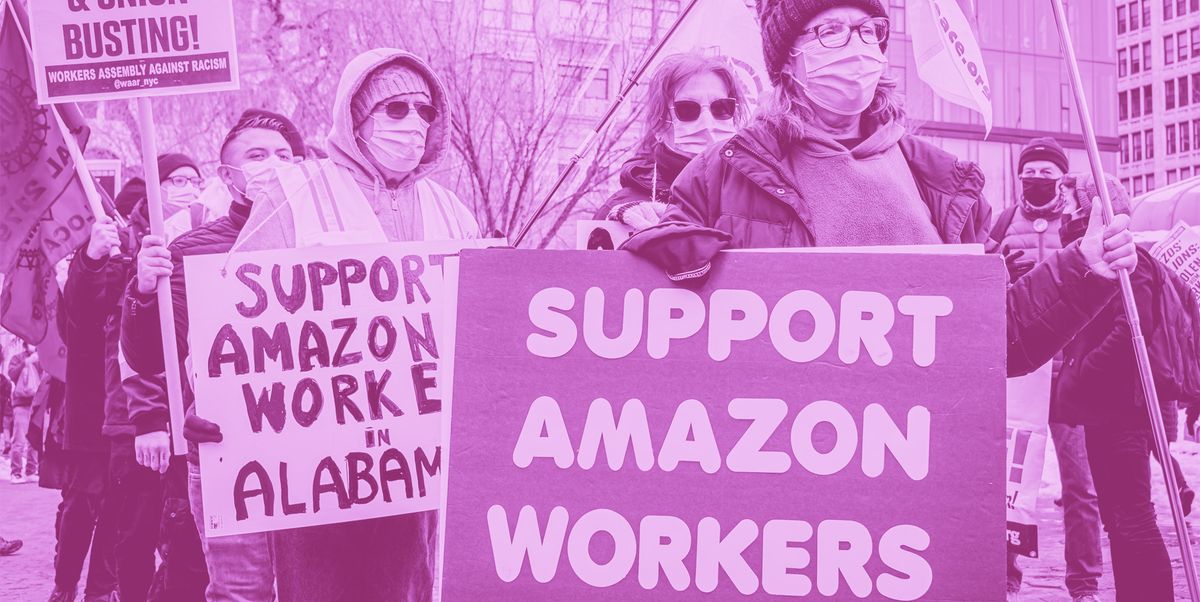From the day she stepped foot into the Amazon warehouse, Jennifer Bates could tell this was going to be a difficult job. Bates works in the fulfillment center in Bessemer, AL, where she says she works long, physically-challenging shifts with short breaks. Other employees have reported needing to meet demanding production quotas, with Amazon closely tracking time spent going to the bathroom or getting water. It was these conditions that prompted Bates to help organize the company’s biggest unionization effort since Amazon was founded more than 25 years ago.
Currently, 5,800 Bessemer warehouse workers—the majority of whom are Black and women—are voting on whether they want to become the first U.S. Amazon employees to unionize, a groundbreaking moment that could set off a domino effect of organizing across the company. Below, in her own words, Bates shares how her co-workers got here—and what they’re still fighting for.
That first week at the Amazon warehouse was rough. My sister, who worked there before me, told me it would get worse. But I hung in there. I thought maybe I was just too new at the job. I thought maybe it would get better.
But as time went on I realized that wasn’t going to happen.
My first day at the warehouse was in May 2020. I was a little bit nervous but excited to be working at a big company like Amazon. I didn’t know what I’d be doing exactly, except that I’d be dealing with products and shipment, and I was ready to do what I could to help build the company. But my first day there, I learned the job involved a lot of walking and climbing stairs in order to get to your station and move products. We also only had two 30-minute breaks during a 10-hour shift.
My co-workers and I—older, younger, middle-aged people—were all limping from climbing up and down the stairs in the four-floor building. I asked once, “Well, there’s an elevator right there. Why can’t we use it?” My co-workers said, “They told us that we couldn’t.” We could put the products on the elevators and send them up, but then we had to take the stairs. It’s like it was designed to punish us for some reason.
So many people were having the same issues, and I could see it wasn’t just me. They had one guy unloading an entire truck by himself when they used to have two or three people do it. Even with COVID-19, they told us they’d let us know if we’d been in close contact with someone who had the virus. But we know for a fact that we’ve worked alongside people who had COVID and we were not alerted. Generally, there was a nonchalant attitude from HR.
I remember one young lady crying because her daughter asked, “Mom, if your hands are hurting, why don’t you just quit?” And she said, “I can’t, baby. I have to pay the bills.” My sister actually did quit because of the conditions and the leadership. Even after I told her we were finally getting a union, she said, “I’m still not coming back.”
We first started to talk about unionizing one day when we were sitting outside on the patio on break. One guy said, “You know what? They wouldn’t be doing this to us if we had a union.” My mind was already racing about the idea. He told me later that he knew who to contact, and he would get back to me about it. And he did. From that point forward, we continued to meet until we got here. That entire time, we tried to keep quiet about organizing while still listening to co-workers and getting their input. Some people were concerned about the breaks and having time to rest. Some were concerned about people getting fired for insufficient reasons without an opportunity to speak with leadership. There was also concern that the workload was too much for being paid $15 an hour.
The day we announced the union, everyone at work was chattering about it. People were very interested and asking each other questions. It gave me chills to see so many people on board.
But then Amazon came with the union-busting.
This content is imported from Twitter. You may be able to find the same content in another format, or you may be able to find more information, at their web site.
It started with flyers in the restroom. There used to be a newsletter in the bathroom to give us updates. Then one day I went in, closed the door, looked up, and saw that the updates were gone. The only thing there was information about why we shouldn’t have a union. Then we started being pulled into meetings where there’d be a big screen that said: “Why You Don’t Need Unions.”
One woman had come from another Amazon warehouse and told us: “When I moved here, I was shocked that you guys only paid $400 a month for rent, so you ought to be grateful for $15.” The room erupted. One young lady said, “What do you mean, $400? Alabama is not cheap.” It was insulting to us for them to come in and think we’re making enough money and didn’t need any more.
A lot of what was said in those meetings was untrue, like telling people they’d lose their benefits if they joined the union. I got frustrated and spoke up, asking specific questions to try to bring out the truth. It was embarrassing on their part. I looked at them like, You ought to be ashamed of yourselves. It was also upsetting to see some of the younger people who were really on board with the union get confused by what was being said in the meetings.
I do hope that because of the union, we will finally have a level playing field. I hope we will be able to talk to someone at HR without being dismissed. I hope that we will be able to rest more, that there will be changes in the facility to take some of the stress off our bodies. I’m hoping we get a living wage—not just [Amazon’s] minimum wage.
Right now, I’m still kind of shocked by the whole process. When we started, I didn’t realize we’d be the first Amazon warehouse to unionize. I’ve already received calls from past coworkers or people who have gone through similar things at their workplace, people who’ve been fired for speaking up and asking for better wages. I think this will be like a fire starter for a lot of companies. Some people have said, “You all at Amazon have given us courage that now we can speak up, and somebody will listen.”
Once the union is recognized, I think we’ll really feel the impact. But right now, we’re still fighting.
[Editor’s note: Amazon spokesperson Heather Knox told ELLE.com that the Bessemer facility has a “starting pay of $15.30 per hour, including full healthcare, vision and dental insurance, 50% 401(K) match from the first day on the job” and that Amazon doesn’t believe the Retail, Wholesale and Department Store Union, which Bessemer workers are voting to join, represents the majority of employees’ views. Knox said, “It’s important that employees understand the facts of joining a union; we have provided education about that and the election process so they can make an informed decision.”]
This interview has been lightly edited and condensed for clarity.
This content is created and maintained by a third party, and imported onto this page to help users provide their email addresses. You may be able to find more information about this and similar content at piano.io

